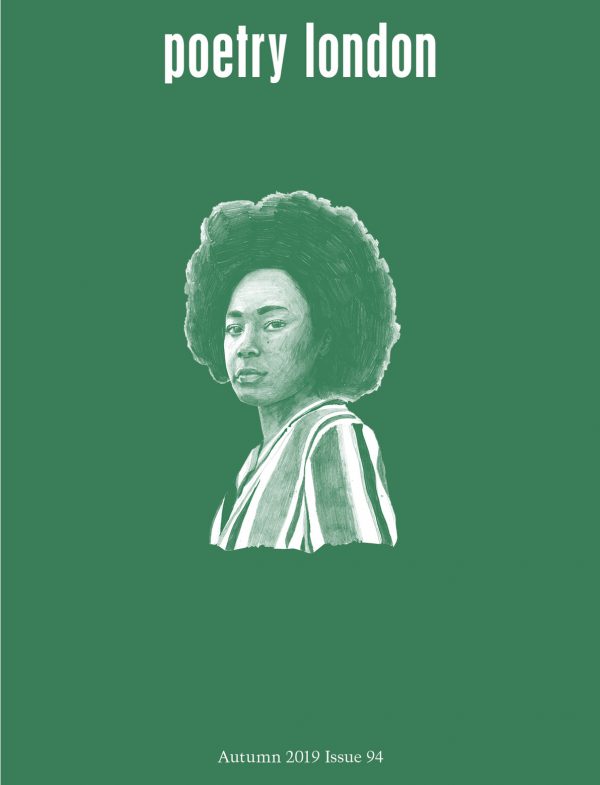Editorial: Cathedral Thinking
Martha Sprackland
One day a man of the people said to Zen Master Ikkyū: ‘Master, will you please write for me some maxims of the highest wisdom?’ Ikkyū immediately took his brush and wrote the word ‘Attention’. ‘Is that all?’ asked the man. ‘Will you not add something more?’ Ikkyū then wrote twice running: ‘Attention. Attention.’
I’ve been having strange dreams, waking in a fevered state. These are anxious, riddling, guilty dreams, shot through with what Emilian Galaicu-Păun, in this issue, calls a ‘creaturely fear of death (not for herself, but for the species)’.
In April of this year the Swedish climate activist Greta Thunberg travelled to London to deliver an excoriating speech at the Houses of Parliament, in which she accused MPs – accused all of us, more accurately – of fiddling while Rome burns. Rome, in this instance, is the entire planet. In her powerful essay for this issue, Karen Solie quotes Marilynne Robinson, who would get on well with Thunberg: ‘We are being starved of the truth, and should miss no chance to tell it when we can.’ This sounds just as much like an instruction for writing poetry as it does for paying heed to the deceptive machinations of a political class unwilling to make difficult decisions.
We have become easily distracted. The myriad things that call us to attend to them are drawing too deeply from the well, sapping our energy. We’re being led off from real, effective action down all sorts of false paths, past baffling, ensnaring news cycles and dubious fact-checking, manifest dishonesty and flagrant corruption, leaving less and less wellwater not only for political action, but also, in another sphere, for the writing of poetry, the thinking about poetry, the challenging of modes of poetry, the application of serious and rigorous criticism of poetry. We are failing our responsibility to our world, and to our world-within-a-world.
‘Can you hear me?’ Thunberg repeated, ‘Did you hear what I just said? Is my English OK? Is the microphone on? Because I’m beginning to wonder.’
It is so often the voices of those most at risk of the devastating effects of climate catastrophe that go unheard: those living on low-lying megadeltas in the Philippines and Cambodia or the flood plains of Bangladesh; those living on the African continent in countries already vulnerable to economic and infrastructural stress; areas like Honduras and Haiti whose drinking water will become salinised, those whose food security will plummet, those whose coastlines will blur and buckle; those whose weather will become a nightmare, those whose houses
will burn.
As we were unnatural to that place,
Our Glyphosate on the wind, our Malathion,
Dust of the gravel roads that bore vehicles
Of gas well company agents,
Fracking derricks across the countyKaren Solie
‘Avoiding climate breakdown will require cathedral thinking,’ Thunberg says. We must be having these conversations, and we must be having them together – there must be a plurality of voices making common cause. For the next three issues of Poetry London we’ll be publishing translated poems in their original versions as well as in English, wherever possible, making these pages, and these conversations, multilingual, and paying due attention to the first language of the poem. Here are poems in Bulgarian, Galician, Romanian and Russian – I hope they are the first of many multifarious voices that this resolutely outward-looking magazine will carry.
For this issue – my first as Poetry Editor – I found myself drawn to poems of care and responsibility, as well as those about fractious dreaming. This took form in experiences of parenthood, like Anthony Anaxagorou’s tender and fretful concern for a son:
He wants to keep a leaf for a pet
I want to warn him about getting
attached to things already lost.
It’s hard not to think of how many of those there are. How many species have we obliterated? The world is falling silent, like ‘The Quiet, draining’ of Mukahang Limbu’s ‘Golden Shovel’. In Kathryn Simmonds’ ‘The Night I Died’ a child’s urgent cry in the dead of night breaks through the sleeping parent’s anxious dream – just as Thunberg and her peers hope to startle us from our own anaesthetised fantasies and into wakefulness.
It was the end of the world –
I called myself a poet. O I cried in my sleep.
Katy Kim
‘How can such things be prevented?’ the speaker asks in Lucy Mercer’s poem; how can we fix the world? It will be very hard, and the writing of poetry is not the answer. In all things, though, we’ll have to come together and hear what is being told to us. The answer to the question, if there is one, might be this – as Solie writes in her essay: ‘change, however small, affirms the capacity for change’. We begin attending; we begin paying the attention that is owed. And we begin now.
theguardian.com/environment/2019/apr/23/greta-thunberg-full-speech-to- mps-you-did-not-act-in-time


